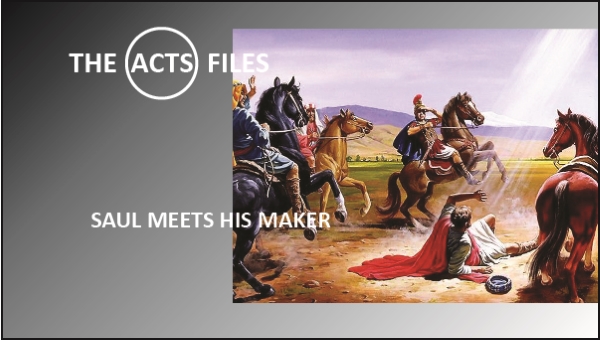By Tyson Thorne

Most of the readers of this site are probably too young to be familiar with the Saturday morning cartoon series Super Friends, but that show had the best narrator voice in the history of cartoons. Why do I bring this up? Because he would always use the transitional statement “Meanwhile…”. For instance, “Meanwhile, at the Hall of Justice…” Luke’s transition into chapter 9 brings back fond memories.
Luke begins with, “Meanwhile Saul, still breathing out threats to murder the Lord’s disciples, went to the high priest…” Before we discover why Saul went to the high priest we need to understand why Luke wants to assure us that Saul was still murdering Christians. While for the reader it was only at the start of the previous chapter that Saul started killing Christ-followers, for Philip and Luke at least a month had past, and possibly as long as six weeks! From the time Philip and Luke left Jerusalem following the death of Stephen they travelled to Samaria where they spent at least a week, then back to Jerusalem and on to Gaza. After a divine appointment with the Ethiopian, Philip worked his way up the coast all the way to Caesarea.
It appears Luke may have started his return to Jerusalem after the Lord whisked Philip to Azotus. Without cell phones it would be impossible for Luke to know where Philip had been transported to. So after several weeks Luke returns to Jerusalem only to find that not much has changed and that, indeed, things were about to get a whole lot worse. Saul had approached the high priest to ask for increased authority in detaining and arresting followers of Jesus. After his success in trapping and executing Stephen, the high priest was inclined to give Saul the authority he requested. With papers in hand, Saul set out for Damascus.
Sometimes super villains become super heroes, and such is the case with Saul. While on the way to Damascus with his companions, almost certainly temple guards who were capable of restraining anyone Saul wanted detained. It was a 170 mile journey and likely took the group eight or nine days (they would have stayed somewhere over the Sabbath). Just as they were nearing the city Saul had his first encounter with Jesus.
When Jesus appeared to Saul it wasn’t in his usual post-resurrection form as the disciples had seen in Acts chapter one. In this appearance Jesus appeared in his glory, shining brightly. Saul stared into the light long enough to make out the figure within as it asked, “Why do you persecute me?” The men traveling with Saul we are told did not see the figure of Jesus, only a bright light (Acts 22.9) and they heard his voice (Acts 9.7). As discussed earlier, one of the prerequisites for being an apostle is having been with Jesus. It is clear from Acts that Saul is the only member of the entourage that actually saw Jesus. While the encounter was short, it was long enough to blind Saul; his men (who presumably looked away from the brightness) had to lead Saul the rest of the way.
Left with little choice but to obey Jesus’ command to enter the city and await instruction, Saul did so. When Christ appeared to Saul on the road to Damascus, he did not overcome Saul’s objections to Christianity, his appearance alone did that; the appearance of Christ in splendid glory proved Saul wrong, and Jesus gave him time to consider this fact. While Saul had no vision for three days, the disability gave him time to see the truth. Being a man who had studied God’s holy Word, he was ecstatic to finally encounter the Lord in such a remarkable way. But the Lord’s question kept burning in his heart: “Saul, Saul, why do you persecute me?” Saul’s intention was not to persecute, but to serve. Yet, in his zeal to be a great servant, he withheld mercy, and had true followers of God put to death. However the Lord chose to deal with him couldn’t be severe enough. Saul came face to face with his humanity, and discovered himself a godless murderer, the worst of sinners.
During this time, Saul had made a life-altering decision. Instead of allowing his pride to overcome his knowledge of God, he decided to renounce all that he had worked for, all that he had lived for, to strike out on a new quest with a God who wasn’t merely a historical figure, but a personal savior. His prayer was that his wife and children might follow, that the whole Sanhedrin would follow him to the gracious gift of life everlasting. That is, if God ever gave him the opportunity to see them again. He had concluded that following Jesus was his best and only option. He concluded this despite the fact that doing so may have meant giving up his family, his job, his life.
|
|
|
